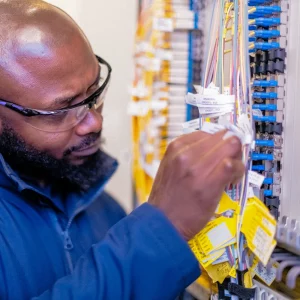Sponsored Links
EXCLUSIVE BT Fault Investigation Charges Frustrate UK Broadband ISPs
Posted: 03rd Aug, 2009 By: MarkJ
Recent changes to how BT charges for its Special Fault Investigations (SFI) have caused frustration among UK broadband ISPs because of the higher costs and administrative hassle that could be incurred by both end-users and providers. At present, if several broadband or telephone line SFIs are carried out on one BT Wholesale fault then only the last clear code is considered for charging purposes, yet under new rules all SFIs will be subject to potential billing.
Chargeable BT Wholesale SFIs are where the engineer has identified a problem within the end user domain for which the end user is responsible. In some cases these can occur after checks have already been done on the network, yet the user may still believe that a fault exists with their broadband service, allowing the ISP to raise an SFI.
Major network developer and ISP supplier, Entanet UK, is particularly disappointed with the news of BT Wholesale's SFI billing changes, which came into force on 20th July 2009 (28 days notice applicable).
BT appears to believe that the comments are unfair and claims that it is seeking a better way to apportion its additional charges. The operator stresses that its wholesale division acts “fairly and transparently”; for example, if multiple SFIs are raised and the final investigation identifies an issue within BT's control then no charges are passed through to the ISP.
However not all ISPs buy BT’s ‘fair’ and ‘transparent’ claims. The small but highly reputable AAISP (Andrews and Arnold) is no stranger to handling SFI disputes and certainly isn’t coy about saying they “have never liked SFI charges”. In fact AAISP has even dedicated an entire page to the problem - http://aaisp.net.uk/kb-broadband-sfi-isp.html - and ironically offer BT an alternative solution (http://aaisp.net.uk/sfi.html), which the operator has never taken.
Some might feel, upon reading all of this, that BT’s system of dealing with and charging for SFI’s is broken and indeed more ISPs have expressed similar concerns to us about it. BT would of course dispute such a conclusion and certainly there will be many occasions where it does work as intended.
In fact even the outspoken AAISP informed ISPreview.co.uk that “various parts of BT have been trying to work with us to resolve [THE SFI PROBLEM] over the years”, so perhaps there is some hope for a better solution, but how much longer will it take?
SFI’s have been quietly annoying some ISPs for awhile and we should not forget that broadband end-users are the ones who ultimately risk being stung the most, especially on occasions where faults might fail to be correctly investigated and logged, let alone fixed.
Chargeable BT Wholesale SFIs are where the engineer has identified a problem within the end user domain for which the end user is responsible. In some cases these can occur after checks have already been done on the network, yet the user may still believe that a fault exists with their broadband service, allowing the ISP to raise an SFI.
Chargeable SFI examples include:Sounds fair, except the reality for ISPs is often somewhat more complicated; with some broadband providers fearing that the latest change could be little more than a revenue generating move by BT. In addition one ISP informed us that BT repeat visits are not the exception, often through no fault of the customer.
- Faults found on non-BT wiring at the end user premises
- Faults found on customer CPE which is not maintained by BT
- Line tested OK by the engineer and fault due to unplugged wires etc.
- Fault proved to broadband modem or router
IDNet’s Director, Simon Davies, said:
“It means we'll have to Dispute more and more SFI charges which increases our admin. It's also wrong of BT to reject any Disputes that are older than 30 days after their invoice as often the case hasn't been fully resolved by then.
There is also an issue with engineer veracity: they'll say one thing to the End User and then complete their forms with different outcome information that results in a charge that the EU was under the impression would not be applicable.
We don't even get to read the Engineers Notes after a WBC SFI call-out!”
“It means we'll have to Dispute more and more SFI charges which increases our admin. It's also wrong of BT to reject any Disputes that are older than 30 days after their invoice as often the case hasn't been fully resolved by then.
There is also an issue with engineer veracity: they'll say one thing to the End User and then complete their forms with different outcome information that results in a charge that the EU was under the impression would not be applicable.
We don't even get to read the Engineers Notes after a WBC SFI call-out!”
Major network developer and ISP supplier, Entanet UK, is particularly disappointed with the news of BT Wholesale's SFI billing changes, which came into force on 20th July 2009 (28 days notice applicable).
Entanet's Technical Support Manager, Neil Watson, said:
"We believe that this is predominantly a revenue increasing exercise and that BT are not fully considering the best interests of their customers. Our experience of BT's fault handling shows that BT repeat visits are not the exception, often through no fault of the customer, therefore we believe it is unfair to punish the customer with additional charges."
"We believe that this is predominantly a revenue increasing exercise and that BT are not fully considering the best interests of their customers. Our experience of BT's fault handling shows that BT repeat visits are not the exception, often through no fault of the customer, therefore we believe it is unfair to punish the customer with additional charges."
BT appears to believe that the comments are unfair and claims that it is seeking a better way to apportion its additional charges. The operator stresses that its wholesale division acts “fairly and transparently”; for example, if multiple SFIs are raised and the final investigation identifies an issue within BT's control then no charges are passed through to the ISP.
A BT Wholesale spokesperson said:
“Previously, BT Wholesale passed on the final engineering visit charge to CPs only and had absorbed other charges raised by Openreach despite previous visits identifying issues that an end user was responsible for rather than BT Wholesale.
BT Wholesale continues to invest tools and techniques to improve broadband performance further and simplify the broadband experience. For example, we launched the patented I-Plate in 2008. This self-install filter has proved, in many cases, to improve an end user's broadband service performance. Prior to this, an engineering visit was necessary to install line filtering.”
“Previously, BT Wholesale passed on the final engineering visit charge to CPs only and had absorbed other charges raised by Openreach despite previous visits identifying issues that an end user was responsible for rather than BT Wholesale.
BT Wholesale continues to invest tools and techniques to improve broadband performance further and simplify the broadband experience. For example, we launched the patented I-Plate in 2008. This self-install filter has proved, in many cases, to improve an end user's broadband service performance. Prior to this, an engineering visit was necessary to install line filtering.”
However not all ISPs buy BT’s ‘fair’ and ‘transparent’ claims. The small but highly reputable AAISP (Andrews and Arnold) is no stranger to handling SFI disputes and certainly isn’t coy about saying they “have never liked SFI charges”. In fact AAISP has even dedicated an entire page to the problem - http://aaisp.net.uk/kb-broadband-sfi-isp.html - and ironically offer BT an alternative solution (http://aaisp.net.uk/sfi.html), which the operator has never taken.
Adrian, AAISP's Director, explained:
“They are pitched in the contract as a service we can buy, should we want, that has a charge of £0 or £144 depending if an end user fault is found. The £144 is not a callout charge but is for work on EU [END-USER] kit beyond the NTE.
When BT announced this at the forum (the SFI) it was as a new service. When launched it was too expensive to be usable but BT stopped doing normal engineers. And they made it that "not finding a fault in BT" means that there must have been one on EU so chargeable!!! We even had end users hiding the router, etc, so that no work (not even a "visual inspection") could be carried out and so the charge could not apply. BT still charged, and still argued when we tried to dispute.
However, when we have a fault, we are not interested in buying that service. We have already bought a service, called IPStream (or WBC) and said service is not working at the delivery point (master socket) and BT have not tested at that point to show it working (only at exchange). We insist they fix the fault in the service we have bought and paid for and we don't order an SFI.
Because of this we never pay for SFI. BT do send engineers (after much badgering) and then they do try and charge for SFI occasionally. We dispute and withhold payment on the basis we did not order the service billed. We no longer even try and go through the clear code dispute teams as they are a nuisance and a lot of work. At the end of the day if we did not order the service billed, BT have to show we did, or take of the bill. Disputes hang around for a long time but we have explained that we do not care about this - we have disputed them - BT have not resolved the dispute - after 6 years they are written off under the Limitations Act. No problem.
BT doesn’t like that, but even this latest change does not change the whole basis of the SFI "service". It is still (as far as we know) a service we have the *option* of buying should we wish. So, ironically, this latest change is not actually any more of an issue. We will still dispute the charges on the basis we did not order the engineer, but there will now be more charges to dispute!”
“They are pitched in the contract as a service we can buy, should we want, that has a charge of £0 or £144 depending if an end user fault is found. The £144 is not a callout charge but is for work on EU [END-USER] kit beyond the NTE.
When BT announced this at the forum (the SFI) it was as a new service. When launched it was too expensive to be usable but BT stopped doing normal engineers. And they made it that "not finding a fault in BT" means that there must have been one on EU so chargeable!!! We even had end users hiding the router, etc, so that no work (not even a "visual inspection") could be carried out and so the charge could not apply. BT still charged, and still argued when we tried to dispute.
However, when we have a fault, we are not interested in buying that service. We have already bought a service, called IPStream (or WBC) and said service is not working at the delivery point (master socket) and BT have not tested at that point to show it working (only at exchange). We insist they fix the fault in the service we have bought and paid for and we don't order an SFI.
Because of this we never pay for SFI. BT do send engineers (after much badgering) and then they do try and charge for SFI occasionally. We dispute and withhold payment on the basis we did not order the service billed. We no longer even try and go through the clear code dispute teams as they are a nuisance and a lot of work. At the end of the day if we did not order the service billed, BT have to show we did, or take of the bill. Disputes hang around for a long time but we have explained that we do not care about this - we have disputed them - BT have not resolved the dispute - after 6 years they are written off under the Limitations Act. No problem.
BT doesn’t like that, but even this latest change does not change the whole basis of the SFI "service". It is still (as far as we know) a service we have the *option* of buying should we wish. So, ironically, this latest change is not actually any more of an issue. We will still dispute the charges on the basis we did not order the engineer, but there will now be more charges to dispute!”
Some might feel, upon reading all of this, that BT’s system of dealing with and charging for SFI’s is broken and indeed more ISPs have expressed similar concerns to us about it. BT would of course dispute such a conclusion and certainly there will be many occasions where it does work as intended.
In fact even the outspoken AAISP informed ISPreview.co.uk that “various parts of BT have been trying to work with us to resolve [THE SFI PROBLEM] over the years”, so perhaps there is some hope for a better solution, but how much longer will it take?
SFI’s have been quietly annoying some ISPs for awhile and we should not forget that broadband end-users are the ones who ultimately risk being stung the most, especially on occasions where faults might fail to be correctly investigated and logged, let alone fixed.
Search ISP News
Search ISP Listings
Search ISP Reviews
Latest UK ISP News








Cheap BIG ISPs for 100Mbps+
150,000+ Customers | View More ISPs
Cheapest ISPs for 100Mbps+
Modest Availability | View More ISPs
Latest UK ISP News
Helpful ISP Guides and Tips
Sponsored Links
The Top 15 Category Tags
- FTTP (6833)
- BT (3896)
- Politics (3086)
- Business (2780)
- Openreach (2673)
- Building Digital UK (2519)
- Mobile Broadband (2490)
- FTTC (2145)
- Statistics (2139)
- 4G (2106)
- Virgin Media (2036)
- Ofcom Regulation (1785)
- 5G (1748)
- Fibre Optic (1607)
- Wireless Internet (1601)
Sponsored
Copyright © 1999 to Present - ISPreview.co.uk - All Rights Reserved - Terms , Privacy and Cookie Policy , Links , Website Rules































